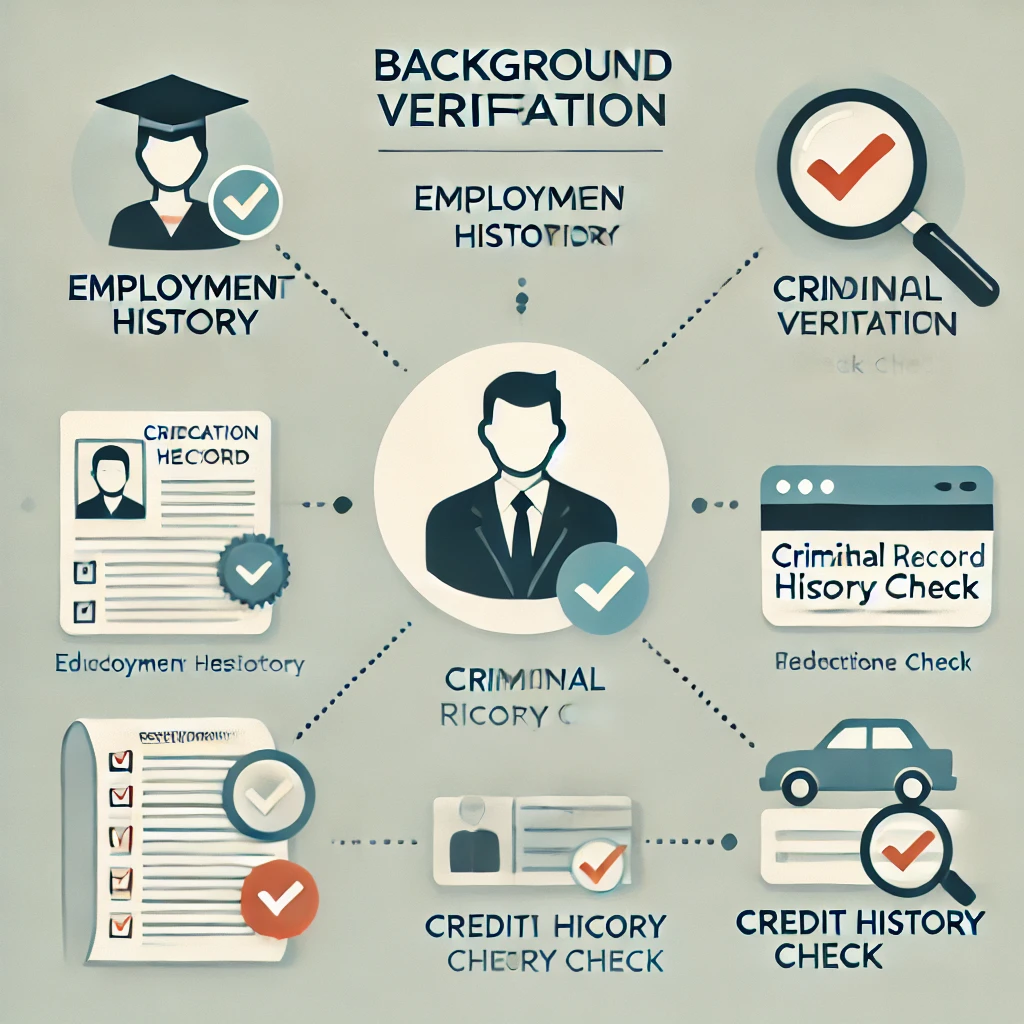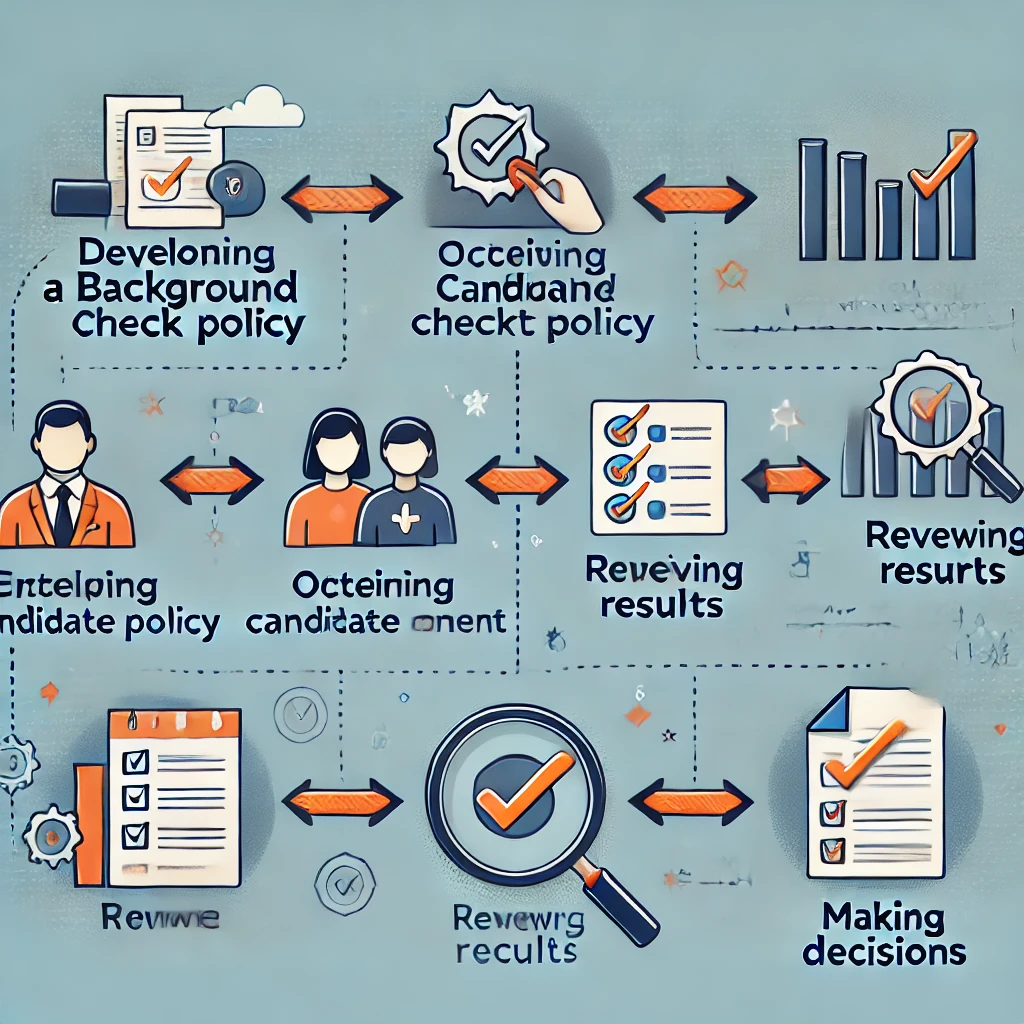In today’s dynamic job market, ensuring that your company hires the right talent is more critical than ever. Background verification has become a crucial step in safeguarding your organization against potential risks. By thoroughly vetting candidates, businesses can protect their reputation, ensure workplace safety, and build a trustworthy team.

What is Background Verification?
Background verification is a meticulous process that involves checking various aspects of a candidate’s history to confirm the accuracy of their claims. It is not just a formality but a vital safeguard to ensure that you are bringing the right people into your organization. Key areas of focus include:

- Employment History: Verifying past job roles, responsibilities, and the duration of employment to ensure consistency with the candidate’s resume. This step helps to confirm that the candidate has the experience and skills they claim to possess, reducing the risk of hiring someone underqualified.
- Education Verification: Confirming degrees, certifications, and educational institutions to validate academic credentials. This verification is particularly important for positions that require specific qualifications, ensuring that your employees have the necessary educational background.
- Criminal Record Check: Screening for any criminal history that could pose a risk to your organization. Depending on the nature of the job, this check is critical for protecting your company from potential legal issues and safeguarding your workplace.
- Credit History Check: Evaluating financial responsibility, particularly for roles involving financial oversight. This check is essential for positions that require a high level of trust and integrity, such as those in finance or management.
- Reference Checks: Gathering feedback from previous employers or colleagues about the candidate’s work ethic and reliability. Reference checks offer insights into the candidate’s behavior and performance in previous roles, providing a clearer picture of how they might fit into your company.
Why Background Verification is Crucial for Your Business
Background verification is not just a step in the hiring process; it’s a strategic measure that can have a long-term impact on your company’s success. Here’s why it’s essential:
- Mitigating Hiring Risks: Conducting thorough background checks helps in identifying candidates who may have falsified their resumes or have a history of problematic behavior. By catching these issues early, you can avoid the costly mistake of hiring someone who isn’t a good fit for your organization.
- Enhancing Workplace Safety: Background verification is essential for roles that involve sensitive information or direct interaction with vulnerable populations, ensuring a safer work environment. For instance, positions in healthcare, education, or finance often require stringent checks to protect clients, customers, and other employees.
- Legal and Regulatory Compliance: Many industries require background checks by law. Ensuring compliance can protect your business from legal liabilities and financial penalties. For example, industries such as banking, healthcare, and transportation often have strict regulatory requirements for employee background checks.
- Protecting Your Company’s Reputation: Hiring someone with a questionable background can have far-reaching consequences, including damage to your company’s reputation. A well-conducted background verification process ensures that your company is associated with trustworthy and competent professionals.
- Promoting a Positive Workplace Culture: When employees know that their colleagues have been thoroughly vetted, it fosters a culture of trust and integrity within the workplace. This can lead to higher morale, better teamwork, and increased productivity.
How to Implement Effective Background Verification

Implementing an effective background verification process requires a strategic approach. Here’s how you can do it:
- Develop a Background Check Policy: Clearly define the types of checks to be conducted and establish criteria for evaluating candidates. Your policy should outline the scope of the verification process, the roles that require more extensive checks, and the steps to be taken if discrepancies are found.
- Obtain Candidate Consent: Secure written consent from the candidate before initiating any background checks. This not only ensures compliance with legal requirements but also fosters transparency in the hiring process.
- Partner with a Reliable Screening Service: Choose a reputable background verification service to ensure accuracy and compliance with legal standards. Look for a provider with a proven track record in your industry, one that understands the specific needs and regulatory requirements of your business.
- Review and Interpret Results: Carefully analyse the findings of the background check, paying close attention to any discrepancies or red flags. Consider how these findings align with the role’s requirements and your company’s values before making a final decision.
- Make Data-Driven Hiring Decisions: Use the verified information to make well-informed decisions that align with your company’s goals and values. Background verification should be integrated into your overall hiring strategy, ensuring that every decision is backed by solid data.
- Ongoing Verification and Monitoring: Consider implementing ongoing verification for current employees, especially those in sensitive roles. Regular updates can help identify any changes in an employee’s background that might affect their suitability for their current position.
- Training Your HR Team: Ensure that your HR team is well-versed in the importance of background verification and understands how to implement it effectively. Provide them with the tools and training they need to conduct thorough and compliant checks.
Conclusion
Incorporating background verification into your hiring process is a strategic move that can significantly reduce risks and enhance the quality of your workforce. By thoroughly vetting candidates, you can build a team that is not only skilled but also trustworthy, ensuring long-term success for your organization. Beyond hiring, background verification contributes to a safer workplace, protects your company’s reputation, and ensures compliance with legal standards. As the business landscape continues to evolve, making background verification a cornerstone of your hiring strategy is more important than ever.

